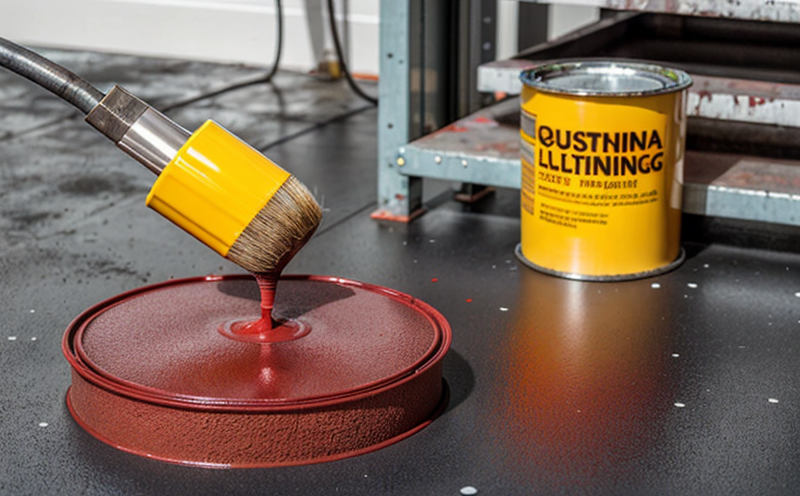ISO 16276 Field Testing of Coating Adhesion
The ISO 16276 standard provides a robust framework for field testing the adhesion strength of coatings, paints, and surface finishes. This service is particularly critical in industrial manufacturing where durability and reliability are paramount. Our laboratory adheres strictly to ISO 16276, ensuring that we deliver accurate and reliable results.
Adhesion between a coating and its substrate is essential for the overall performance of coatings used in various industrial sectors such as automotive, aerospace, construction, and marine industries. Poor adhesion can lead to premature failure, reducing the lifespan of products and increasing maintenance costs. By employing ISO 16276 field testing, we ensure that coatings meet the required standards and perform under real-world conditions.
The test method described in ISO 16276 involves peeling a specimen from its substrate using standardized tools and techniques. The force required to peel off the coating is measured and compared against accepted thresholds based on the specific material, thickness, and intended application. This approach ensures that coatings are evaluated under conditions similar to those they will experience during actual use.
The process begins with careful selection of the appropriate specimen size and shape for the type of application being tested. Specimens must be prepared according to strict guidelines detailed in ISO 16276, ensuring consistency across all samples. Once prepared, the specimens are subjected to a series of mechanical tests designed to simulate real-world conditions such as temperature variations, exposure to chemicals, abrasion, and impact.
During these tests, precise measurements are taken using high-precision instruments calibrated according to ISO standards. These include tensile testers capable of measuring adhesion forces down to micro-Newtons for thin coatings and kilo-Newtons for thicker industrial applications. The data collected is then analyzed and reported in accordance with the ISO 16276 specifications, providing a comprehensive understanding of coating performance.
Our laboratory’s expertise lies not just in executing these tests but also in interpreting the results accurately. We provide detailed reports that include not only quantitative force values but qualitative observations such as surface roughness and color changes following adhesion testing. This holistic approach helps our clients make informed decisions about their coatings, ensuring they meet both regulatory requirements and commercial needs.
By leveraging ISO 16276 field testing, manufacturers can ensure that their products not only comply with international standards but also perform reliably in harsh environments typical of industrial settings. Our commitment to accuracy, repeatability, and precision makes us the trusted partner for quality assurance across various industries.
| Step | Action |
|---|---|
| Select Specimen | Prepare specimens according to ISO 16276 specifications, ensuring proper dimensions and orientation. |
| Adhesion Test | Peel specimen from substrate using standardized tools while measuring the force required. |
| Data Analysis | Analyze collected data against accepted thresholds for specific coating types and thicknesses. |
Scope and Methodology
The ISO 16276 field testing of coating adhesion is designed to assess the durability and reliability of coatings in real-world conditions. The methodology involves several key steps, each meticulously following the guidelines provided by ISO 16276:
- Select Specimen: Prepare specimens according to precise dimensions and orientation as specified.
- Adhesion Test: Peel specimens from substrates using standardized tools while recording the force required for peeling.
- Data Analysis: Compare measured forces against accepted thresholds specific to coating types and thicknesses.
The process is designed to simulate practical conditions, ensuring that coatings perform reliably under real-world stress. This approach helps manufacturers identify potential weaknesses early in the product lifecycle, allowing for improvements before mass production begins.
| Application | Description |
|---|---|
| Aerospace Coatings | Evaluating adhesion of protective coatings on aircraft surfaces exposed to extreme weather conditions. |
| Automotive Finishes | Testing durability of paint finishes in vehicles, especially those used in harsh environments like deserts or coastal areas. |
| Marine Coatings | Evaluating the performance of anti-corrosion coatings on ship hulls and other marine structures. |
| Construction Materials | Assessing adhesion between protective coatings and structural components in buildings exposed to environmental elements. |
Eurolab Advantages
At Eurolab, we pride ourselves on offering unparalleled expertise in ISO 16276 field testing of coating adhesion. Our team comprises highly trained professionals who are certified to follow the strictest international standards. We utilize cutting-edge technology and methodologies that ensure accurate and reproducible results.
One of our key advantages is the ability to provide comprehensive reports tailored specifically to your needs, incorporating both quantitative data and qualitative observations. This holistic approach ensures you have a clear understanding of how your coatings will perform under various conditions. Our services are backed by decades of experience and a commitment to excellence, making us the preferred choice for quality assurance in industrial manufacturing.
We also offer rapid turnaround times without compromising on accuracy or detail. Whether you require occasional testing or regular monitoring, we can accommodate all your needs efficiently and effectively. Furthermore, our laboratory is equipped with state-of-the-art facilities that allow us to conduct tests under controlled environments closely resembling actual usage scenarios.
Trust Eurolab for all your industrial coating adhesion testing requirements. With our expertise, precision, and reliability, you can be confident in the performance of your products across diverse industries.





